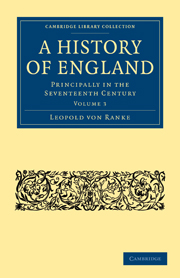Book contents
- Frontmatter
- Contents
- BOOK XI THE COMMONWEALTH IN ENGLAND, 1649—1653
- BOOK XII THE PROTECTORATE OF OLIVER CROMWELL, 1653–1658
- BOOK XIII FALL OF THE PROTECTORATE AND THE COMMONWEALTH. RESTORATION OF THE MONARCHY, 1658—1660
- BOOK XIV THE FIRST FIVE YEARS UNDER CHARLES II. THE RESTORATION OF THE ANGLICAN CHURCH
- BOOK XV THE DUTCH WARS OF CHARLES II. ESTABLISHMENT OF THE PROTESTANT AND PARLIAMENTARY CHARACTER OF THE CONSTITUTION 1664—1674
- INTRODUCTION
- CHAP. I The first war with Holland, in the year 1665
- CHAP. II Influence of France upon the continuation of war and upon the peace
- CHAP. III Fall of the Lord Chancellor Clarendon
- CHAP. IV Convention at the Hague in January 1668. Triple Alliance
- CHAP. V Government and Parliament in the year 1668
- CHAP. VI Secret alliance with France, 1669, 1670
- CHAP. VII Parliamentary sessions from, 1669 to 1671
- CHAP. VIII The second war against Holland, 1672
- CHAP. IX Origin of the Test Act
- CHAP. X Peace with Holland
- CHAP. XI Union of Parliament with the Prince of Orange
CHAP. IV - Convention at the Hague in January 1668. Triple Alliance
Published online by Cambridge University Press: 07 June 2011
- Frontmatter
- Contents
- BOOK XI THE COMMONWEALTH IN ENGLAND, 1649—1653
- BOOK XII THE PROTECTORATE OF OLIVER CROMWELL, 1653–1658
- BOOK XIII FALL OF THE PROTECTORATE AND THE COMMONWEALTH. RESTORATION OF THE MONARCHY, 1658—1660
- BOOK XIV THE FIRST FIVE YEARS UNDER CHARLES II. THE RESTORATION OF THE ANGLICAN CHURCH
- BOOK XV THE DUTCH WARS OF CHARLES II. ESTABLISHMENT OF THE PROTESTANT AND PARLIAMENTARY CHARACTER OF THE CONSTITUTION 1664—1674
- INTRODUCTION
- CHAP. I The first war with Holland, in the year 1665
- CHAP. II Influence of France upon the continuation of war and upon the peace
- CHAP. III Fall of the Lord Chancellor Clarendon
- CHAP. IV Convention at the Hague in January 1668. Triple Alliance
- CHAP. V Government and Parliament in the year 1668
- CHAP. VI Secret alliance with France, 1669, 1670
- CHAP. VII Parliamentary sessions from, 1669 to 1671
- CHAP. VIII The second war against Holland, 1672
- CHAP. IX Origin of the Test Act
- CHAP. X Peace with Holland
- CHAP. XI Union of Parliament with the Prince of Orange
Summary
All the world was terrified by the rapid progress of the French arms in the Spanish Netherlands: there was a general conviction that England would as little endure this occupation now as ever before. And as the Republic of the United Netherlands was also openly threatened by the occupation of the Belgian province, an alliance between the two seemed to be perfectly natural. Amongst English statesmen there was one who even in a subordinate position became important, because he made it the especial object of his life to carry out this aim—William. Temple, Resident at Brussels. At the Congress of Breda he had become convinced by conversation with the ambassadors, especially with the ambassador of France, that after the conclusion of the peace, England and Holland must enter into alliance, for their interests were the same. He observed that it was the only means of loosening the alliance between Holland and France, and of resisting the French, who were not only powerful, but had a spirited and energetic government; their ambition embraced Europe, bounds must be set in time to their usurpations, or they would care for no one and would recognise no other power as their equal. He was never tired of urging this upon his government. In September 1667 he found an opportunity of talking about it to the leading statesman of the Republic, John de Witt.
- Type
- Chapter
- Information
- A History of EnglandPrincipally in the Seventeenth Century, pp. 464 - 478Publisher: Cambridge University PressPrint publication year: 2010First published in: 1875



